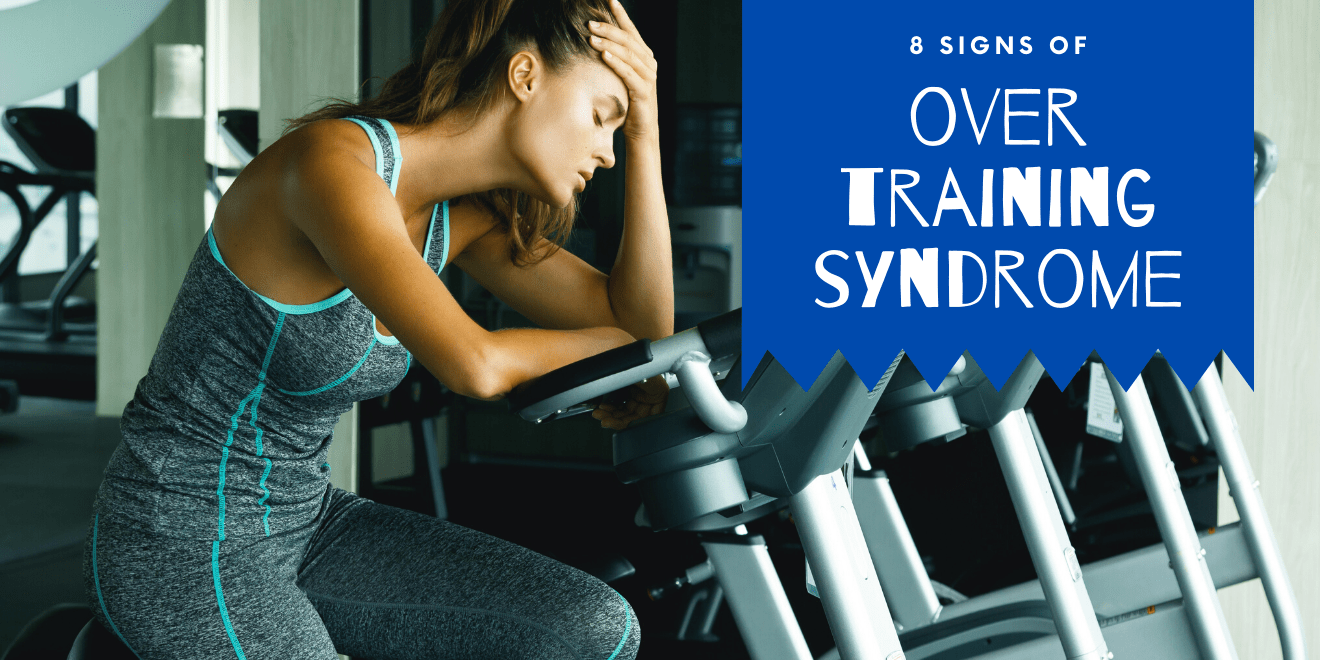8 Signs of Overtraining Syndrome and What Can You Do About It

Ah, overtraining – not something we even consider when we take our first tentative steps in working out.
After all, how can we overtrain? Isn’t all training good for us?
As it turns out, it’s not. In fact, as most experienced gym-goers will tell you, building muscle is as much about rest as it is about lifting weights. Runners will tell you the same thing – you can’t expect your body to just infinitely keep going. If that were the case, we’d all be as fit as fiddles our entire lives, provided we put the work in.

Overtraining sucks, just to share my personal experience as well. When I first started going to the gym, I used to put in 5k every morning in the local park, and then I’d put another hour in at the gym in the evening. Maybe with an occasional rest day thrown in there. And trust me, it wasn’t a nice feeling.
But I know how we can trick ourselves into overtraining – we want to see better results, it feels good, we are hooked on the feeling, and we can’t really buy into the “I need to rest” thing.
Let’s go over the eight signs of overtraining syndrome, and if you find yourself nodding along while you read, let’s also discuss how you can get back on the right track.
We are all somewhat used to feeling a bit tired now and again. Some of us have even accepted that this is just how we feel and are living with it.
However, one of the more prominent signs of overtraining is a lack of energy, a general feeling of sluggishness and fatigue. Everything is just a bit difficult, and you can’t really be bothered with anything.
[caption id="attachment_35318" align="aligncenter" width="920"] Nothing like the DOMS (delayed onset muscle soreness) to through a wrench into training.[/caption]
Nothing like the DOMS (delayed onset muscle soreness) to through a wrench into training.[/caption]
Contrary to popular belief , pain is the first sign that you have overdone it. If your muscles are sore the day after a workout, if this soreness persists for more than 72 hours, if you experience DOMS – this is a clear sign that your body is not recovering well, and that you need to stop doing what you are doing.
Some will tell you there is no gain without pain – or that soreness is the sign that you are doing something right. Don’t believe them. Yes, working out should be a challenge – but it shouldn’t leave you in pain for days.
The connection between sleep and overtraining is a complex one: and while you may think that tiring yourself out with a workout can put you to sleep easier (and this is the case when you train well), overtraining can keep you awake.
As you are not able to relax completely, you are not able to drift off to sleep, or you wake up a lot during the night, tossing and turning as you go. This, in turn, means your body will not be able to get the rest it needs and repair the damage you have caused while working out.
[caption id="attachment_35319" align="aligncenter" width="920"] Loss of appetite is one of a number of symptoms due to over-training.[/caption]
Loss of appetite is one of a number of symptoms due to over-training.[/caption]
You need to fuel your workouts with the right nutrients – carbs, proteins, fats all play an important role in helping your performance.
However, if you feel like you don’t really have to eat, or you can’t eat and there is nothing appetizing about food, you will be putting yourself at risk in a whole host of ways: a lack of nutrients means your body can’t repair itself, and that you are driving it too far on too little. Your immune system can suffer, you can get injured more easily, and your feeling of fatigue will only increase.
As your immune system can no longer keep up with the demands you are putting on your body, you will be more susceptible to colds, inflammatory diseases , and all kinds of other illnesses. You can also experience a lot of headaches, and that icky feeling when you are not ill, but you are not healthy either.
A lack of sleep and increased stress will cause you to become more irritable. Stress will also boost your cortisol production, which will make losing weight that much harder , your performance will suffer, you won’t be as ready to go to the gym. Overall, you’ll just be an irritable sack of moodiness.

These mood swings will also lead to a drop in your confidence, and you won’t feel as good as you used to while working out.
The weights you were once able to lift and the distances you were able to run will become increasingly difficult, and you’ll be forced to cut back. This will translate into a sluggish progression, and your already dampened mood will slip further into the gutter as well.
When all the above starts to happen, you will naturally be much more susceptible to injuries. When you’re simply not as focused, not as able, not as ready to perform as you normally would be, anything from sprains and tears to more serious injuries is more likely to occur.

What can you do about it?
If you have recognized these symptoms in yourself – don’t worry. There is a way back, and while you may not like it, it can help you get back “to normal.”
Of course, this is not all.
The key to health and fitness lies in the trifecta I so love to mention sleep, nutrition, and working out.
Here’s what you need to pay attention to in terms of sleep and nutrition to maximize your workouts:

Prolonged overtraining will just make your symptoms worse and compromise your body even more. It will take longer to recover, and you won’t see the progress you had in mind.
In fact, why would you want to keep overtraining, when it’s not giving you what you are looking for?
After all, how can we overtrain? Isn’t all training good for us?
As it turns out, it’s not. In fact, as most experienced gym-goers will tell you, building muscle is as much about rest as it is about lifting weights. Runners will tell you the same thing – you can’t expect your body to just infinitely keep going. If that were the case, we’d all be as fit as fiddles our entire lives, provided we put the work in.

Overtraining sucks, just to share my personal experience as well. When I first started going to the gym, I used to put in 5k every morning in the local park, and then I’d put another hour in at the gym in the evening. Maybe with an occasional rest day thrown in there. And trust me, it wasn’t a nice feeling.
But I know how we can trick ourselves into overtraining – we want to see better results, it feels good, we are hooked on the feeling, and we can’t really buy into the “I need to rest” thing.
8 Signs of Overtraining Syndrome (and what you can do about it)
Let’s go over the eight signs of overtraining syndrome, and if you find yourself nodding along while you read, let’s also discuss how you can get back on the right track.
A general feeling of fatigue
We are all somewhat used to feeling a bit tired now and again. Some of us have even accepted that this is just how we feel and are living with it.
However, one of the more prominent signs of overtraining is a lack of energy, a general feeling of sluggishness and fatigue. Everything is just a bit difficult, and you can’t really be bothered with anything.
Specific and general pain
[caption id="attachment_35318" align="aligncenter" width="920"]
 Nothing like the DOMS (delayed onset muscle soreness) to through a wrench into training.[/caption]
Nothing like the DOMS (delayed onset muscle soreness) to through a wrench into training.[/caption]Contrary to popular belief , pain is the first sign that you have overdone it. If your muscles are sore the day after a workout, if this soreness persists for more than 72 hours, if you experience DOMS – this is a clear sign that your body is not recovering well, and that you need to stop doing what you are doing.
Some will tell you there is no gain without pain – or that soreness is the sign that you are doing something right. Don’t believe them. Yes, working out should be a challenge – but it shouldn’t leave you in pain for days.
Trouble sleeping
The connection between sleep and overtraining is a complex one: and while you may think that tiring yourself out with a workout can put you to sleep easier (and this is the case when you train well), overtraining can keep you awake.
As you are not able to relax completely, you are not able to drift off to sleep, or you wake up a lot during the night, tossing and turning as you go. This, in turn, means your body will not be able to get the rest it needs and repair the damage you have caused while working out.
Loss of appetite
[caption id="attachment_35319" align="aligncenter" width="920"]
 Loss of appetite is one of a number of symptoms due to over-training.[/caption]
Loss of appetite is one of a number of symptoms due to over-training.[/caption]You need to fuel your workouts with the right nutrients – carbs, proteins, fats all play an important role in helping your performance.
However, if you feel like you don’t really have to eat, or you can’t eat and there is nothing appetizing about food, you will be putting yourself at risk in a whole host of ways: a lack of nutrients means your body can’t repair itself, and that you are driving it too far on too little. Your immune system can suffer, you can get injured more easily, and your feeling of fatigue will only increase.
Getting ill more often
As your immune system can no longer keep up with the demands you are putting on your body, you will be more susceptible to colds, inflammatory diseases , and all kinds of other illnesses. You can also experience a lot of headaches, and that icky feeling when you are not ill, but you are not healthy either.
Mood swings
A lack of sleep and increased stress will cause you to become more irritable. Stress will also boost your cortisol production, which will make losing weight that much harder , your performance will suffer, you won’t be as ready to go to the gym. Overall, you’ll just be an irritable sack of moodiness.

These mood swings will also lead to a drop in your confidence, and you won’t feel as good as you used to while working out.
Performance drops
The weights you were once able to lift and the distances you were able to run will become increasingly difficult, and you’ll be forced to cut back. This will translate into a sluggish progression, and your already dampened mood will slip further into the gutter as well.
Injuries
When all the above starts to happen, you will naturally be much more susceptible to injuries. When you’re simply not as focused, not as able, not as ready to perform as you normally would be, anything from sprains and tears to more serious injuries is more likely to occur.

What can you do about it?
If you have recognized these symptoms in yourself – don’t worry. There is a way back, and while you may not like it, it can help you get back “to normal.”
- Stop working out hard – If you are lifting, this will mean no weights for a while. If you are running, you will need to cut down on your speed and distances.
- Switch to some light cardio – jogging or biking – but nothing too extreme and vigorous.
- Seven days is all it will usually take – unless your body is extremely exhausted, in which case you might need to take a longer break.
Of course, this is not all.
7 Lifestyle Tips to Keep Overtraining and Burn-out at Bay
The key to health and fitness lies in the trifecta I so love to mention sleep, nutrition, and working out.
Here’s what you need to pay attention to in terms of sleep and nutrition to maximize your workouts:
- You need to teach yourself to sleep more and sleep better. Establish new and beneficial sleeping habits, and ensure your body has enough time to recover from the day.
- Eat well – I don’t need to go into what that means, as you already know what a balanced diet is. Of course, you can let yourself off for having something essentially bad for you occasionally. But 80% of your diet should still be good for you.
- Also, make sure you are eating enough. This will depend on your goals, but even if you are trying to lose weight and working out at the same time, you can’t under-eat, as that will not give you the results you need. Your workouts need proper fuel – so give it to them.
- Don’t work out if you are in pain – ever. It’s better to take a couple of days off than to risk making everything worse.
- Always add rest days to your routine. They are not days of slacking off, but rather an essential part of the split.
- Don’t train for over an hour at a high intensity – an hour is enough. If you are doing low to moderate impact exercises, you can work out for more, but don’t forget you still need to rest.
- Try to stress less – I know this is a cliché, but stress really is the worst possible enemy to your quality of life, and to the quality of your workouts.
Wrap Up

Prolonged overtraining will just make your symptoms worse and compromise your body even more. It will take longer to recover, and you won’t see the progress you had in mind.
In fact, why would you want to keep overtraining, when it’s not giving you what you are looking for?




































































































